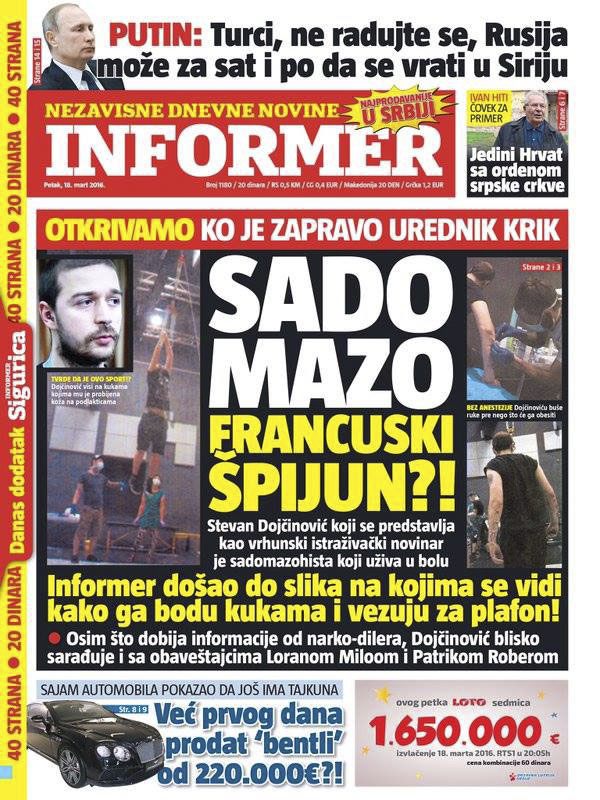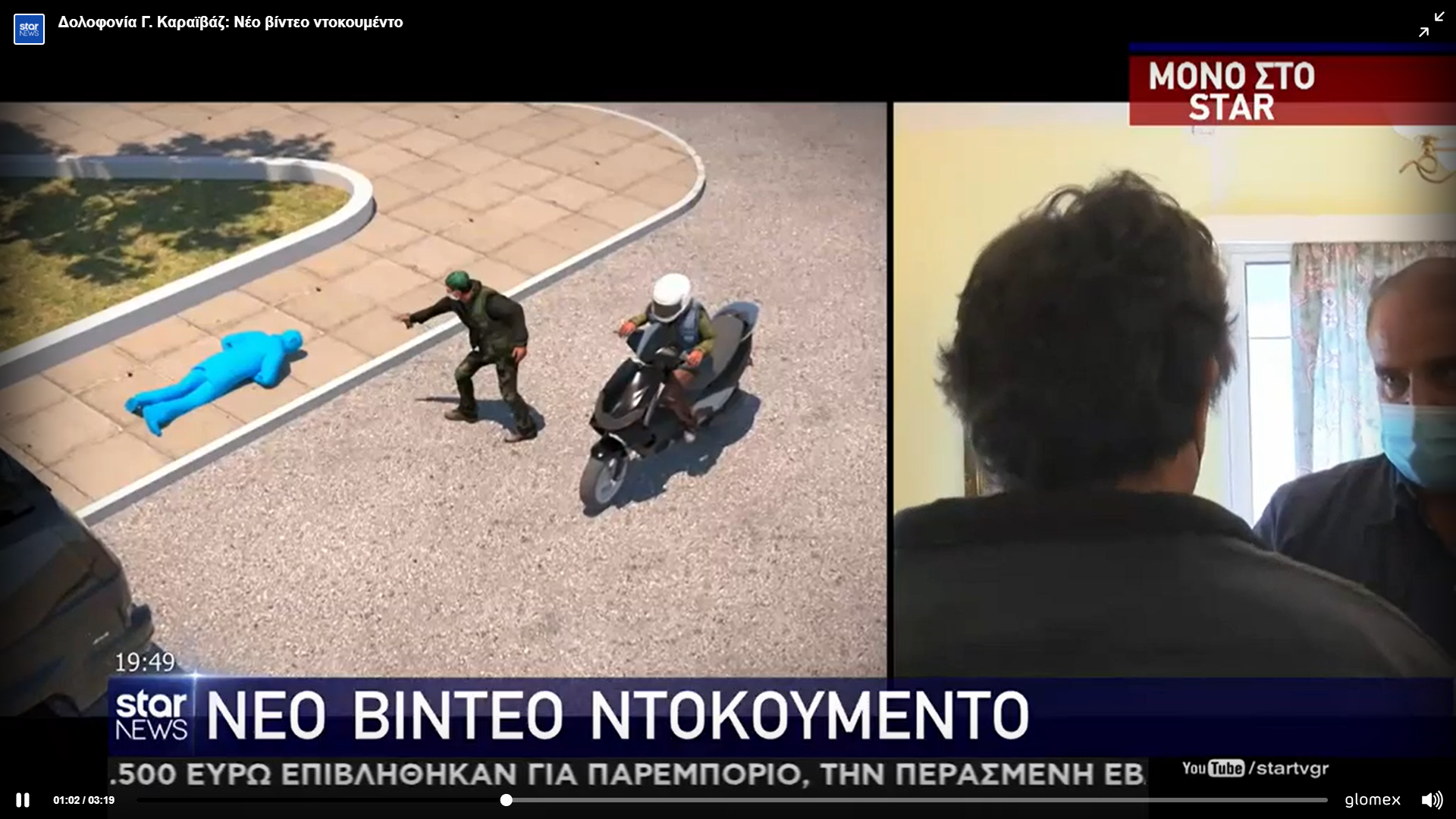“If a journalist is killed, it means that the parallel state has taken over, or even worse.”
This is a quote from an article by Kostas Vaxevanis, a journalist and editor at the Greek daily Documento, written after the murder of his colleague Giorgos Karaivaz in April 2021.
Karaivaz was the 14th journalist to be killed in Europe since the start of 2017. Many more have been intimidated, threatened and attacked, because of their work and dedication to the public.
The most exposed are journalists who are investigating the connections between organized crime networks and the political elite. One of them, Bojana Jovanović, deputy editor of the Crime and Corruption Reporting Network (KRIK) in Serbia, describes journalism today as a dangerous profession.
“The authorities pose a greater threat than the criminal organizations,” explains Jovanović, who knows quite a bit about how dangerous it is to be a journalist in Serbia.
Examples from other countries, including some EU member states, are showing a similar picture.
Targeted threats
A group of prominent international media freedom organizations recently issued a report about the situation in Serbia expressing their concerns about media freedoms and the safety of journalists.
Just one of many examples of media under attack in Serbia is KRIK, a network based in Belgrade, whose journalists have for years been exposed to attacks and harassment. In some cases these attacks are coming directly from high-ranking Serbian politicians, who do not hesitate to use media loyal to their parties and the government, for smear campaigns against other media.
However, this has not stopped KRIK from becoming one of the most prominent media organizations in the Balkans, with multiple awards, not only from Serbia but also internationally. Since 2015, KRIK has also been part of the OCCRP network, which aims to “expose and explain the relationship between money and power” across the world.
Bojana Jovanović was one of a number of colleagues who launched KRIK six years ago believing that the public needs the media to expose the “suspicious and corrupt practices of leaders, their links with people from organized criminal organizations and misuse of state budgets.”

Bojana Jovanović, deputy editor and journalist at KRIK, says it is essential that the media expose the wrongdoing of public officials. Photo: Bojana Jovanović’s private archive.
“If it weren’t for us, citizens would never know that Minister of the Interior Aleksander Vulin can’t explain the origins of the money he used to buy his apartment,” she says, beginning to list some of their most influential stories in recent years.
“Or that Minister of Finance Siniša Mali was the director of an offshore company that bought 24 apartments in Bulgaria; or about the mutual acquaintances of both Minister of Health Zlatibor Lončar and the infamous criminal organization the ‘Zemun Clan,’ which also had links to the police and other state structures.”
Each of these stories made KRIK and its journalists more vulnerable, but also more determined to continue investigating. Nevertheless, it became more difficult not only due to the threats, but also due to limited access to what should be public information.
“Government officials whose assets we have investigated do not agree to be interviewed; they do not want to answer our questions at press conferences, they avoid journalists, or even attack us,” Jovanović explains.
But despite the pressures, KRIK keeps reporting, no matter what.
Over 50 people have died in this war for influence and revenge popularly referred to as the “Montenegrin clan war.”
Editor-in-chief Stevan Dojčinović and his team are regularly in the media offering their insights about the investigations they are working on.
Dojčinović has also written a book on the “Balkan Drug King” Darko Šarić, who was arrested in South America in 2014 and extradited to Serbia. In 2018, Šarić was sentenced, with his associates, to 15 years in prison for cocaine smuggling.
After the fall of his clan a relentless struggle for domination and control over drug trafficking from South America to Europe began in the Balkan region, and some new names were suddenly public. According to the OCCRP, since 2014, the mafia war has expanded between two Montenegrin clans from Kotor — the Škaljari and Kavač families — and the killings have been transferred across borders.
According to media reports, over 50 people have died in this war for influence and revenge popularly referred to as the “Montenegrin clan war.”
The regional public became aware of the war through the reporting of KRIK, whose journalists exposed some of the connections between the authorities in Serbia and the mafia.
The war against KRIK
In 2016, Serbia’s minister of the interior announced an official clampdown on the mafia. KRIK’s Dojčinović has said that the subsequent indictments from the Serbian courts were an intentional attempt to weaken the Škaljari clan with arrests and prosecutions, with KRIK’s investigations having shown that the Kavač clan has links to the Serbian political leadership, police and even to Vučić’s son. Their reporting on this exposed KRIK journalists to additional pressure.
The smear campaign against KRIK was backed by pro-government media such as TV station Pink and tabloids such as Informer, Kurir and Srpski Telegraf, with Alo calling KRIK a “mafia newsletter.”
“We have been labeled criminals, enemies of the authorities, foreign mercenaries and spies,” Jovanović recalls.
The defamation campaign based on disinformation and fake news was supported by some members of the ruling SNS party. During a parliamentary session in March 2021, MPs Sandra Božić and Vladimir Orlić both claimed that KRIK cooperated with organized crime groups.

Smear campaigns are one of the tools those in power use against KRIK journalists, including editor-in-chief Stevan Dojčinović who has successfully sued one tabloid. Photo: Katja Lihtenvaler.
These false accusations were met with disbelief and were widely rejected by the public, with KRIK receiving support from many different corners, including Vladimir Bilcik, the European Parliament’s Permanent Rapporteur on Serbia, who expressed his concern over the campaign directly targeting KRIK journalists.
According to Jovanović, the goal of the campaign against KRIK was to stop them from investigating corruption and criminal connections between government officials.
Unfortunately, fighting these types of smear campaigns has become part of their work for KRIK journalists over the past few years.
In 2016, Dojčinović successfully sued the tabloid Informer for harming his reputation and disclosing details from his private life after they called him a “sadomasochistic French spy,” “mafia associate” and “terrorist.”
“The pro-government media operates under the dictatorship of the authorities,” Jovanović says. “It would be difficult to say that this kind of reporting has anything to do with journalism.”
A journalist killed in Athens
In early April this year, two strangers on a moped, shot and killed 52-year-old journalist Giorgos Karaivaz. The attack was committed outside of his home in the Alimos neighborhood of Athens. Colleagues describe Karaivaz as an extremely knowledgeable crime reporter.
Before his tragic murder, Karaivaz was a staff journalist for the private TV channel STAR, which among much of the Greek public and journalists does not enjoy a credible reputation. Their reporting is considered controversial, and as has been proved in some cases, has at times involved disinformation, video montages and adapted reports in order to adjust events to a certain agenda.
Karaivaz was also the editor-in-chief of a crime reporting site, Bloko.gr, where his skills, expertise and good connections with police authorities were evident.
Matthaios Tsimitakis, a journalist and former communications officer for Alex Tsipiras during his time as Greek prime minister, told K2.0 that Karaivaz used to report on organized crime in Greece “which was gaining more influence in the country by corrupting officials, including the police.”
Attacks on media headquarters in Greece are quite frequent occurrences, but killings of journalists are extremely rare.
“Contrary to other professionals in his field, he didn’t have the reputation of someone who acts like a spokesperson for the police,” Tsimitakis says. “That gained him respect both inside the police as well as with the journalist community. But it also made him enemies among a few corrupt police officers and organized crime groups.”
Karaivaz’s murder even shook the European Commission. Vera Jourova, commissioner for values and transparency, tweeted the same day: “I am deeply shocked following reports that journalist Giorgos Karaivaz was shot dead in Athens.”
Kyriakos Mitsotakis, the Greek prime minister, waited one day to issue a statement demanding a “fast investigation of the case.”
Attacks on media headquarters in Greece are quite frequent occurrences, but killings of journalists are extremely rare. The last one before Karaivaz happened 11 years ago when journalist Socratis Giolias was assassinated outside of his house in Athens. Prior to his death Giolias had been working on an investigation about corruption.

Screenshot of Star TV’s reconstruction of Giorgos Karaivaz’s murder. Image: Katja Lihtenvaler.
Both Giolias and Karaivaz were killed in a rain of bullets by people still unknown. According to police, Karaivaz was shot in a mafia-style execution, and investigators immediately linked the tragedy with the so-called “Greek Mafia.”
The Greek media reported that the police investigated some 100 videos, called for statements from 22 people, and searched Karaivaz’s personal cellphone when it was clear that the murder had no personal motive but was connected with his work.
“In 2016 to 2018 Karaivaz covered a series of homicides, part of a local mafia war in Athens, and he didn’t hesitate to reveal names publicly, to talk about the role of each and every actor, including corrupt policemen and criminals with ties to the political system,” Tsimitakis recalls.
In one of his last reports, Karaivaz had been investigating the case of Menios Fourthiotis, a minor conservative TV presenter who has links to the leading political party, New Democracy. Fourthiotis has subsequently been implicated in a fraud scandal and has been accused of having links to organized crime.
Just two days before Karaivaz’s murder, Documento editor-in-chief Vaxevanis was contacted by a source who said that Fourthiotis was planning a plot to “kill him [Vaxevanis] and one other journalist.”
Fourthiotis was later arrested on suspicion of various offences, including staging an attack on his own home, gang formation and weapons violations. He is still in jail, but to date no connection with the murder of Karaivaz has been established.
Corrupt police and a war between crime groups
Karaivaz’s investigative work and his revelations on the Star TV channel he worked for show that he was not afraid to disclose names. While reporting on executions in the Greek underworld Karaivaz was straightforward, saying: “Some of the murders among organized crime groups show links with wealthy business owners, politicians, but in some cases also police officers and Orthodox church staff.”
Karaivaz’s work before his death reveals he was moving into the dangerous world of corrupt police officers, influential politicians and organized crime groups but his murder still came as a shock.
“Since Karaivaz worked for the media company of one of the most powerful families in the country, it would be expected that he would be protected,” says Tsimitakis, referring to the Vardinogiannis family, which owns the New Television S.A. media conglomerate that Star belongs to.
Tsimitakis wonders whether Karaivaz’s murder shows not only an attack on the press, but could reveal other issues in the future.
The Greek organized crime world is similar right now to that of Montenegro and Serbia; waging a war for dominance that started four years ago and is counting victims monthly. Since Karavaiz’s death in April three other people have been killed in similar circumstances in Athens.
“Reporting on organized crime is a dangerous job in any country.”
Matthaios Tsimitakis, Greek journalist
But many international groups have also moved to Greece or at least showed their presence in recent years. Some names are already familiar to the Serbian public due to KRIK’s reporting.
In January 2020 two members of the Montenegrin so-called Škaljari Clan, were shot dead in Athens while dining with their families. Six months later two more members of the same gang were executed while spending time on the Greek island of Corfu. During the investigation police revealed that between 10 and 15 people from the Balkans directly connected with the Škaljari-Kavač dispute had found shelter in Greece.
While organized crime groups continue their conflict, police investigations into those crimes show no results, and journalists’ lives remain under threat.
“Reporting on organized crime is a dangerous job in any country,” Tsimitakis says. “Karaivaz was one of the very few people that had managed to enter the world of organized crime and actually report about it in detail.”
The deaths of Ján Kuciak and Martina Kusnirova
At the end of February 2018, 27-year-old journalist Ján Kuciak and his fiancee, archaeologist Martina Kusnirova, were shot dead in their home in Velka Maca, close to the Slovakian capital, Bratislava.
“Ján Kuciak was a very talented investigative journalist,” says Lukas Diko, the former director of news at RTV Slovakia and now editor-in-chief at the Ján Kuciak Investigative Center (ICJK).
Diko explains that after the murder, Slovakian society found itself “in a state of horror and shock.”
Kuciak was working for the Aktuality.sk news portal and was covering allegations of tax evasion and fraud involving high-ranking officials with strong political ties, shady businessmen and organized crime gangs. He was also cooperating with OCCRP. After his murder the group published a series of his articles and a timeline explaining the events leading up to his death.
Nevertheless, the murder brought some change in Slovakia, politically and socially, but also in the media. The first reaction came from the public who took to the streets in their tens of thousands for the first time since the fall of communism. They protested the murder, as well as the rule of Prime Minister Robert Fico.
The downfall of criminal groups and prosecution of top officials does not mean that Slovak journalists are working peacefully and undisturbed.
As a result, three weeks later, Fico resigned, and two years after that, in March 2020, his Social Democrat party lost the elections, with voters giving an opportunity to anti-corruption activist and populist Igor Matovič.
The new government opened various corruption investigations, including into some of the cases that were investigated by Kuciak and his colleagues. In this process, a network of top officials who were allegedly bribed by the former wealthy business owner, Marian Kočner — one of the main protagonists of Kuciak’s work — were arrested.
“People who were untouchable before were arrested and charged with money laundering and corruption,” says Diko as he talks about what he calls “the transformation of the judicial system.”
But, he stresses, the downfall of criminal groups and prosecution of top officials does not mean that Slovak journalists are working peacefully and undisturbed.
“The biggest problem for journalists in Slovakia now is political pressure and insults coming from different high-ranking politicians,” Diko says.
Shelter for international organized crime
According to a State Department report from 2014, Slovakia “was a transit destination country for counterfeit and smuggled goods, auto theft, value-added tax fraud, and trafficking in persons, weapons, and illegal drugs run by domestic and foreign organized crime.”
Since the 1990s, after the fall of the Iron Curtain, many organized crime groups, especially from Eastern and Southeastern Europe, found shelter in Slovakia. For instance Baki Sadiki, the Kosovo Albanian boss of a heroin trafficking ring, found a home and a friendly relationship with a top judge there in the 1990s. He was later arrested in Kosovo and extradited to Slovakia, where he is currently serving a 22-year prison term for drug charges.
Ongoing investigations and trials are exposing the public details of the connections between former state structures in Slovakia and organized crime.
Slovakia was also among the EU countries that were extremely generous in handing passports to different people linked to organized crime. Among them, Dragoslav Kosmajac, “a Serbian Escobar” and alleged founder of a major Balkan drug route, received Slovak citizenship in the country’s capital, Bratislava, in 2004. Kosmajac died last year in Serbia as a free man.
Darko Šarić reportedly also held permanent residence in Slovakia from 1998 and gained Slovak citizenship in 2006. With the use of an EU passport, Šarić was able to escape the authorities.
In one of his final investigations Kuciak was looking into links between the Italian “Ndrangheta” criminal gang from the Calabria region and the Slovakian political elite, with a focus on alleged links between the “Ndrangheta” and a member of Fico’s cabinet, Maria Troskova. He never finished his work.
Ongoing investigations and trials are exposing the public details of the connections between former state structures in Slovakia and organized crime.
In April 2020, former soldier Miroslav Marček was jailed for 23 years after admitting to carrying out the killings of Ján Kuciak and Martina Kusnirova, while two suspects were jailed for facilitating the attack. Marian Kočner, who was accused of masterminding the attack, and an alleged co-conspirator were acquitted by the first instance court. The Slovak Supreme Court will make a final judgment on the double murder case on June 15, 2021.
Journalists in Slovakia are not giving up. In order to provide protection for each other, but also to talk about difficulties they face during their work, they have been cooperating across newsrooms in a project connected to the murder investigation called “Kočner’s Library,” under the coordination of ICJK.
“This cooperation is unique; journalists from competing media have been cooperating,” Diko explains. “That helps them feel secure, and together they have more analytical power.”
The team recently won Slovakia’s 2020 “Journalist Award” for investigative and analytical journalism for their investigation into alleged money laundering by the oligarch Norbert Bödör.
“When journalists are killed and the killer is not a madman, it means that democracy is rotten, the ultimate debasement of the rule of law. When a journalist is killed it’s more than a crime. It’s proof of a dangerous reality,” concluded Vaxevanis in his story after the Karaviaz murder in Athens.
Journalists in Greece, Serbia and Slovakia have learned this lesson the hard way.
Feature image: Katja Lihtenvalner.




